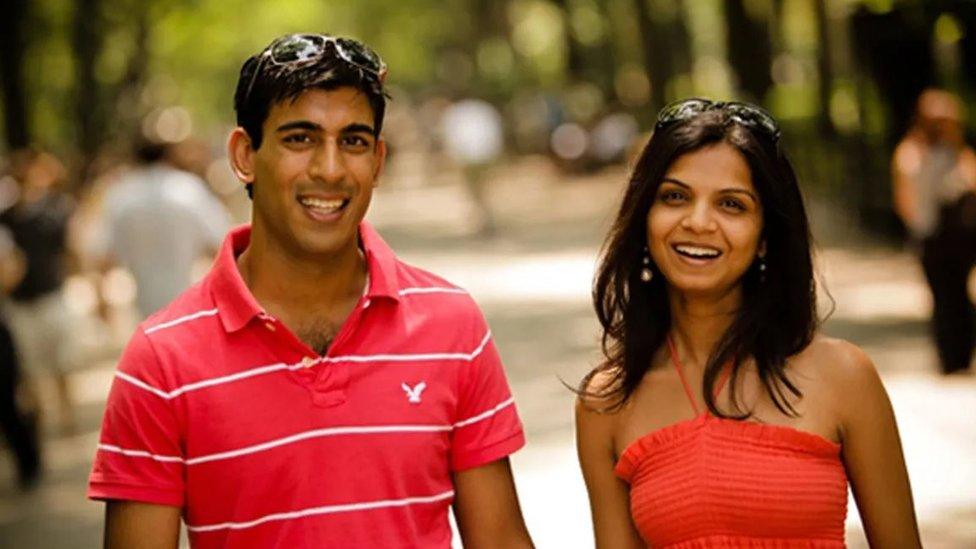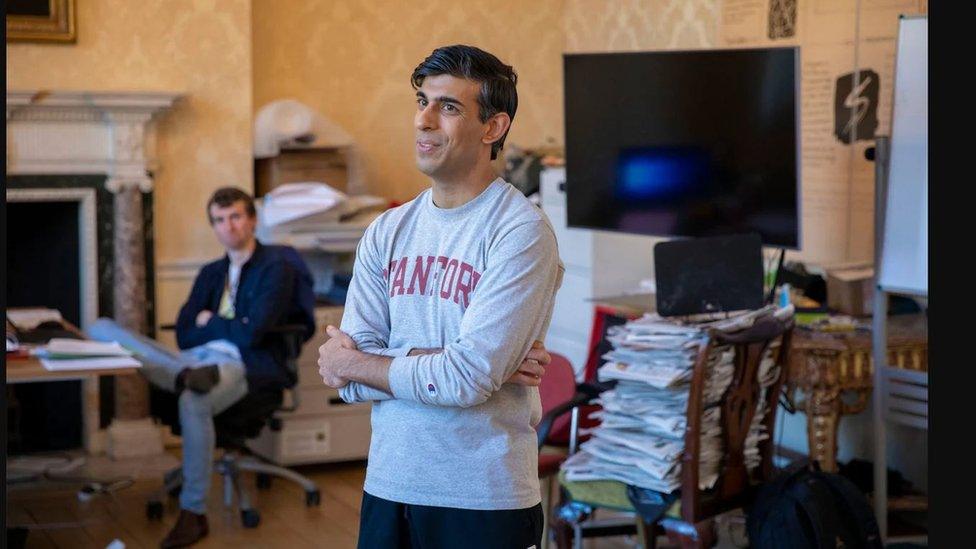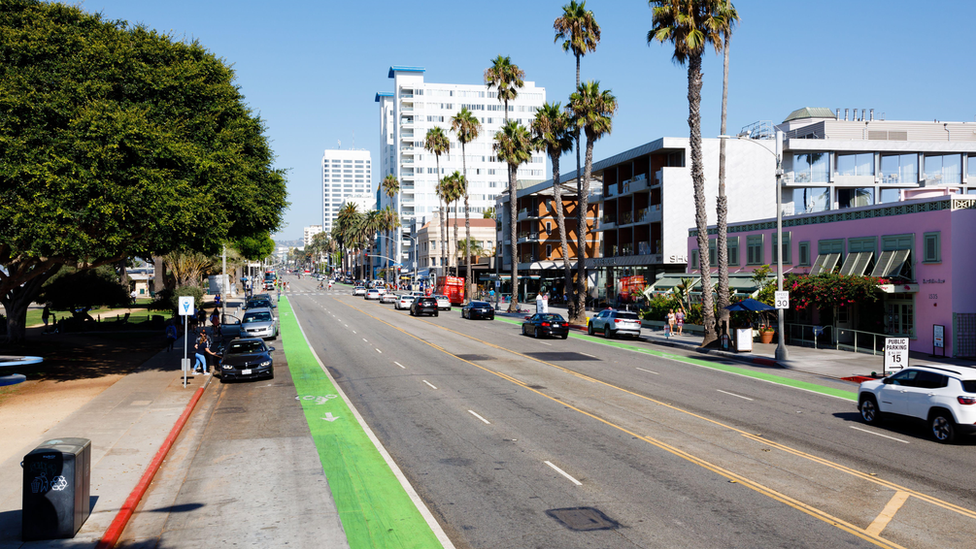Rishi Sunak: How the US shaped Britain's new leader
- Published

Rishi Sunak and Akshata Murty in California
The UK's new prime minister points to his time in the US studying and working as a defining part of his life. So what are Rishi Sunak's American connections?
The 42-year-old has made the California chapter of his biography a key part of his public persona.
He frequently cites his time there in his 20s and early 30s to burnish his credentials as a business-savvy leader.
"I have lived and worked in California and I actually think it's one of the reasons that I would be good at this job," he told the BBC's Laura Kuenssberg last month while running for the Conservative leadership.
"Because what I will bring to this job is a way of thinking that is different. When we think about growth and in a modern economy, how do you drive growth - you drive it through innovation. Because of my experience I know how to build that type of economy."
Here's a closer look at this period which had such an impact on him.
The 'power couple' on campus
Mr Sunak started his years in America at Stanford University's Graduate School of Business as a Fulbright Scholar, heading to Silicon Valley in 2004 as the internet boom was under way.
The programme, which admits roughly 400 students per year, has a reputation as the most exclusive business degree in the country.
Among the classes Mr Sunak took was "The Paths to Power", intended to help students understand power and how to wield it effectively.
He did not earn any particular academic distinctions and his professor in that class was unable to recollect him - understandably, given he taught 100 students a year.
But a more life-changing landmark in those early US years occurred when he met his wife, Akshata Murty, daughter of the founder of Indian tech firm Infosys.
Classmates at the time have told biographer Michael Ashcroft that they were a "power couple" on campus.

Rishi Sunak wearing his Stanford sweater
Derrick Bolton, who was assistant dean of admissions from 2001-2016 and remains friendly with the couple, said Mr Sunak entered the programme "very self-assured".
"He knew from a young age that he wanted to make an impact on as many people as possible."
Earlier this summer the couple invited Mr Bolton to Downing Street for tea, where they lived in Mr Sunak's capacity as chancellor. They showed their visitor exhibits on former chancellors and served biscuits marking the Queen's Jubilee.
Mr Bolton, who attended their New York wedding celebration in 2009, said he was surprised they made the time.
"Despite the lofty titles and significant responsibility, they are the same two lovely people they were as students - open and kind and humble and remarkably self-effacing," he said. "They're very low-key, very chill."
Welcome to Santa Monica
After graduating, Mr Sunak took a lucrative job at the London-based hedge fund, TCI Fund Management.
Mr Sunak focused on the US, participating in the firm's bitter 2008 fight with the leaders of America's CSX freight railroad.
Lawyer Marc Weingarten, who worked closely with Mr Sunak at this point, said he stood out as a "sponge for information".
"He was all over it," he said. "They [Mr Sunak and his boss] had studied the industry and CSX in depth for months and their mastery of the industry and CSX was astonishing."
In 2009, in the wake of the financial crisis, top leaders at TCI left to start their own firm Theleme and took Mr Sunak with them.
He became part of a team of two based in Santa Monica, a beach-side city just outside Los Angeles, and famous as the home of celebrities such as David Beckham and Christian Bale.

Ocean Avenue, Santa Monica. where the Sunaks lived
He invested in companies such as Rupert Murdoch's News Corp and started to put down ties to the area, joining the board of local Boys & Girls Club, a charity which runs after-school programmes and other activities for needy children.
Aaron Young, who led the organisation at the time, said he was surprised to see Mr Sunak become prime minister but that his ambition was always evident.
"I think he always had aspirations," Mr Young said.
End of the California dream
Mr Sunak ultimately left the US, won a seat in the UK Parliament in 2015 and started his rapid ascent in British politics. But his California years have remained a frequent touchstone.
He has said he tried to introduce a "start-up" mentality while leading the Treasury Department, and credited Stanford for pushing him to shed "incremental" ways of thinking.
The years in the US also informed his decision to back Brexit, he told the BBC in 2019.
"The pace of change is just accelerating around the world - that was my experience being in California," he said. "My general broad view was given the pace of change... being independent and having the flexibility and nimbleness to react would be of enormous value to us."

More on Rishi Sunak and his family


Problematic ties
Mr Sunak and his wife continue to maintain a flat in Santa Monica, which they regularly visit. But his ties to the US have at times caused an outcry.
This year, it emerged he had retained his Green Card, giving him the right to live and work in the US as a permanent resident. He returned it in October last year, ahead of his first American trip as a government minister.
The disclosure occurred around the time it was revealed his wife held non-domiciled status, meaning she did not have to pay tax on earnings from outside the UK.
The controversies have been used to raise questions about Mr Sunak's commitment to the country, despite his being born and raised in the UK, said Victoria Honeyman, professor of British politics at the University of Leeds.
"There are legitimate questions - if you are chancellor of the exchequer, should your wife have non-dom status? Should you own a green card? The problem is that it gets tied up with a lot of issues that are not necessarily valid," she said, adding: "I'm not sure a white politician would have to make those kinds of justifications to the same degree."
But such controversies are low-level compared to the economic and political crisis he now faces as prime minister, said Rod Dacombe, director of the Centre for British Politics and Government at King's College London.
"The thing that's going to make or break him isn't the kind of story that he presents or his ties to America.
"It's going to be how he deals with the almost impossible economic situation that he's going to face," he said. "Is it going to be fixed in time for the next election? Probably not."